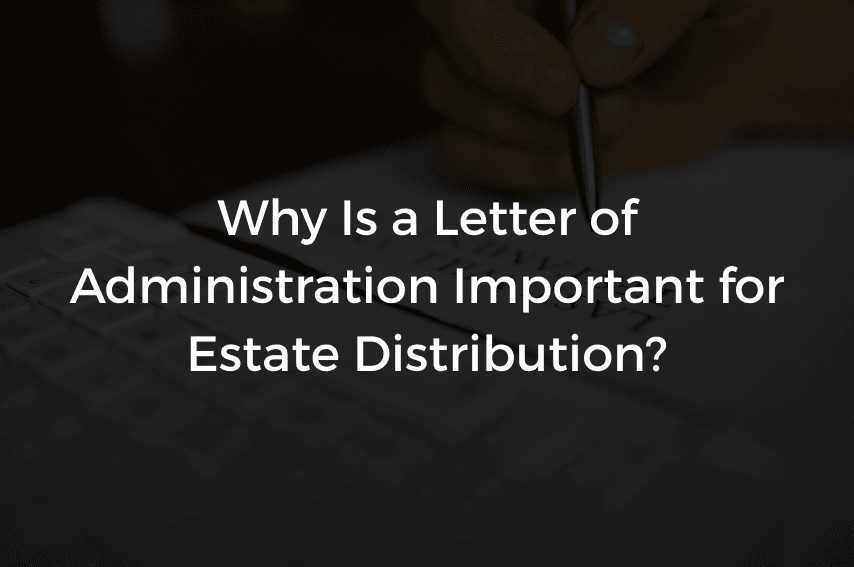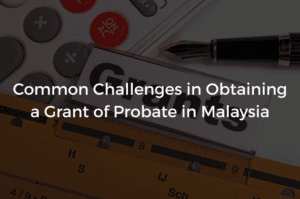When a person in Malaysia passes away without leaving a valid will, their estate cannot be distributed automatically to family members or next of kin. Instead, the law requires a formal process to ensure fairness, accountability, and compliance with the Probate and Administration Act 1959. In such cases, the court issues a Letter of Administration (LA), which grants authority to an appointed administrator to collect, manage, and distribute the deceased’s assets according to intestacy laws.
Without this document, banks, land offices, and financial institutions will not release the assets, leaving the estate effectively frozen. This can cause significant delays and financial hardship for the beneficiaries. Obtaining a Letter of Administration is therefore not just a legal requirement, but a crucial step in ensuring that heirs receive their rightful inheritance in an orderly and lawful manner.
What Is a Letter of Administration in Malaysia?
A Letter of Administration (LA) is a court order issued under the Probate and Administration Act 1959 that authorises an appointed administrator to manage and distribute the estate of a person who has died without leaving a valid will (intestate). Unlike a Grant of Probate, which applies when there is a will and an executor named, a Letter of Administration is required to deal with estates where no will exists.
In Malaysia, the right to apply for LA typically lies with the next of kin or a close family member, such as a spouse, child, or parent of the deceased. The appointed administrator is legally responsible for collecting the assets, paying off debts, and distributing the estate in accordance with the Distribution Act 1958, which sets out the entitlement of heirs in cases of intestacy.

Why a Letter of Administration Is Essential for Estate Distribution
A Letter of Administration is crucial because it acts as the legal proof that the appointed administrator has the authority to manage and distribute the deceased’s estate. Without it, there is no recognised representative to collect assets, settle debts, or handle estate matters.
The document also prevents misuse of assets or interference by unauthorised parties, ensuring that only the administrator recognised by the court can act. For institutions such as banks, land offices, and investment bodies, the Letter of Administration provides the certainty they require before releasing funds or transferring property.
Most importantly, it protects beneficiaries under the Distribution Act 1958, ensuring that assets are divided fairly and according to the law of intestacy. This reduces the likelihood of disputes and safeguards heirs’ rights to receive their lawful inheritance.

The Estate Distribution Process Without a Will
When a person dies without a will in Malaysia, their assets are distributed based on specific legal frameworks. For non-Muslims, distribution follows the Distribution Act 1958, which sets out the entitlements of spouses, children, parents, and other relatives. For Muslims, the estate is divided according to Faraid principles under Islamic inheritance law.
A Letter of Administration (LA) ensures that this process is carried out in strict compliance with these frameworks. Once the LA is granted, the administrator must follow a clear step-by-step flow:
1.Application
The next of kin or eligible family member applies to the High Court for the LA.
2. Grant Issued
The court formally issues the Letter of Administration, recognising the administrator’s authority.
3. Assets Collected
The administrator identifies, secures, and gathers all estate assets.
4. Debts Settled
Outstanding debts, taxes, and liabilities are paid from the estate.
5. Distribution
The remaining assets are distributed to heirs in accordance with the Distribution Act 1958 or Faraid.
This structured process ensures fairness, transparency, and legality in estate administration when no will exists.

Conclusion
A Letter of Administration (LA) is not merely a procedural formality—it is the cornerstone of lawful estate distribution in Malaysia when no will exists. By obtaining LA, families can ensure that the deceased’s assets are collected, debts are settled, and inheritance is distributed fairly under the Distribution Act 1958 or Faraid principles. Without it, assets remain frozen, disputes may arise, and rightful heirs may face unnecessary financial hardship. The LA process provides the legal certainty, transparency, and protection that beneficiaries need during a difficult time.
If your loved one has passed away without a will, don’t let the estate remain frozen. At Sim & Rahman, our legal experts will guide you through the Letter of Administration process to ensure fair and lawful distribution. Contact us today!




